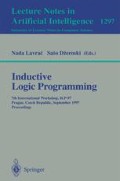Abstract
A system for ‘tagging’ words with their part-of-speech (POS) tags is constructed. The system has two components: a lexicon containing the set of possible POS tags for a given word, and rules which use a word's context to eliminate possible tags for a word. The Inductive Logic Programming (ILP) system Progol is used to induce these rules in the form of definite clauses. The final theory contained 885 clauses. For background knowledge, Progol uses a simple grammar, where the tags are terminals and predicates such as nounp (noun phrase) are non-terminals. Progol was altered to allow the caching of information about clauses generated during the induction process which greatly increased efficiency. The system achieved a per-word accuracy of 96.4% on known words drawn from sentences without quotation marks. This is on a par with other tagging systems induced from the same data [5, 2, 4] which all have accuracies in the range 96–97%. The per-sentence accuracy was 4 49.5%.
Preview
Unable to display preview. Download preview PDF.
References
Steven Abney. Part-of-speech tagging and partial parsing. In Ken Church, Steve Young, and Gerrit Bloothooft, editors, Corpus-Based Methods in Language and Speech. Kluwer, Dordrecht, 1996.
Eric Brill. Some advances in transformation-based part of speech tagging. In AAA794, 1994.
J. Cussens. Part-of-speech disambiguation using ILP. Technical Report PRG-TR-25-96, Oxford University Computing Laboratory, 1996.
Doug Cutting, Julian Kupiec, Jan Pedersen, and Penelope Sibun. A practical part-of-speech tagger. In Third Conference on Applied Natural Linguistic Processing (ANLP-92), pages 133–140, 1992.
W. Daelemans, J. Zavrel, P. Berck, and S. Gillis. MBT: A memory-based part of speech tagger-generator. In Proceedings of the Fourth Workshop on Very Large Corpora,, pages 14–27, Copenhagen, 1996.
S. Muggleton. Inverse entailment and Progol. New Generation Computing Journal, 13:245–286, 1995.
Lawrence R. Rabiner. A tutorial on hidden Markov models and selected applications in speech recognition. Proceedings of the IEEE, 77(2):257–285, February 1989.
Christer Samuelsson, Pasi Tapanainen, and Atro Voutilainen. Inducing constraint grammars. In Laurent Miclet and Colin de la Higuera, editors, Grammatical Inference: Learning Syntax from Sentences, volume 1147 of Lecture Notes in Artificial Intelligence, pages 146–155. Springer, 1996.
Pasi Tapanainen and Atro Voutilainen. Tagging accurately — Don't guess if you know. In Proc. ANLP94, 1994.
Author information
Authors and Affiliations
Editor information
Rights and permissions
Copyright information
© 1997 Springer-Verlag Berlin Heidelberg
About this paper
Cite this paper
Cussens, J. (1997). Part-of-speech tagging using Progol. In: Lavrač, N., Džeroski, S. (eds) Inductive Logic Programming. ILP 1997. Lecture Notes in Computer Science, vol 1297. Springer, Berlin, Heidelberg. https://doi.org/10.1007/3540635149_38
Download citation
DOI: https://doi.org/10.1007/3540635149_38
Published:
Publisher Name: Springer, Berlin, Heidelberg
Print ISBN: 978-3-540-63514-7
Online ISBN: 978-3-540-69587-5
eBook Packages: Springer Book Archive

